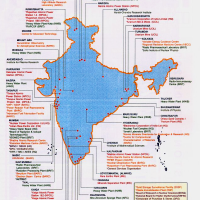Odisha readies draft of auto component policy Investors may be offered 50% rebate on land cost besides other sops.
Jayajit Dash / Kolkata/ Bhubaneswar Jun 27, 2012,
Odisha, which is looking to diversify its investment basket beyond core metallurgical industries, has readied the draft of its proposed auto component policy to woo investors in the sector.
With such policy already in vogue in peer states like Gujarat, Tamil Nadu, Rajasthan, Haryana and Karnataka, the Odisha government does not wish to miss out on the huge potential offered by the buoyant auto component sector.
The draft auto component policy prepared by Omega Tast, a consultant assisted by UK government‘s international donor agency- Department for International Development (DFID), envisages a concession of up 50 per cent on land to be made available to auto component manufacturers. On the power subsidy front, it talks of electricity duty waiver for 10 years.Among the other fiscal incentives delineated in the policy include 100 per cent exemption on entry tax on plant, machinery, raw materials and other inputs. The draft also talks of reimbursement of value added tax (VAT) paid for a period of 20 years, limited to 200 per cent of fixed capital investment.
The draft policy has also proposed a capital grant of up to 25 per cent of fixed capital investment (excluding land cost), subject to a maximum of Rs one crore. Private auto park developers would also be entitled to capital grant of up to 20 per cent of the fixed capital investment (excluding land cost), subject to a limit of Rs two crore, according to the daft policy.
“The draft auto component policy has been prepared meticulously after comparing incentives offered by states that have already formulated such policies. We have now sought the considered views of Investment Promotion & Investment Corporation of Odisha Ltd (Ipicol) on the draft policy”, said an industries department official.
As per the cost-benefit analysis estimates made by Omega Tast, for every fiscal incentive of Rs 7732 to be provided by the state government, one permanent job will be created in the auto component industry. This implies that an incentive of Rs 15 crore offered by the state government will generate approximately 19,400 jobs.
On revenue estimates, the draft policy says if an auto OEM (original equipment manufacturer) invests Rs 2000 crore in the state, it would result in potential tax revenue of Rs 90 crore to the state once the plant is fully operational.
Odisha which has attracted investments worth over Rs 13.66 lakh crore across sectors, mostly from mineral-based industries, has attracted only one major investment in the auto component manufacturing space.
RSB Transmission had entered into an MoU (Memorandum of Understanding) with the state government for setting up an auto component manufacturing plant at Choudwar near Cuttack at an estimated cost of around Rs 400 crore.
The state offers good resources to support automobile component manufacturing units like availability of quality pig iron, pure aluminium ingot, steel flat products and steel rounds.
In addition to this, there is availability of skilled personnel for the sector with manpower drawn from institutes operating in the city like Central Tool Room Training Centre and Central Institute for Plastic Engineering & Technology (CIPET).
The Indian auto component industry has been registering growth of 20 per cent per annum since 2000 and is projected to maintain high growth range of 15-20 per cent till 2015.
The industry which touched $10 billion in 2005-06 is expected to grow four-fold to $40 billion by 2015.
Related articles
- Against all odds, a struggle continues- Seven years on (kractivist.wordpress.com)
- Odisha dalit rape victim dies (kractivist.wordpress.com)
- Vedanta-Mining Company’s PR Campaign Backfires in India #FakingHappiness (kractivist.wordpress.com)











